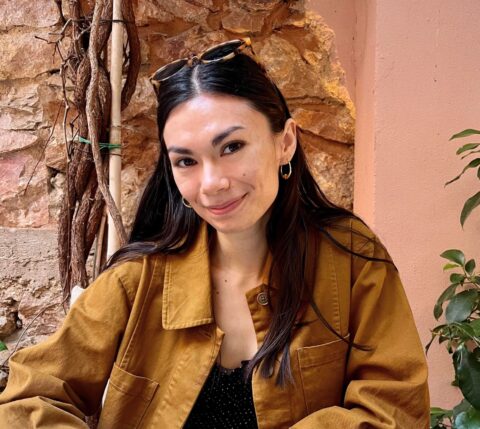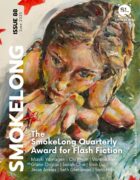I would love to know more about the relationship between Auntie June and Shannon. Are these characters you could see using in future stories?
I actually imagined the setting first—the dim apartment with the old carpet and the flickering TV screen, Hamburger Helper and Newports and the Ms. Pac-Man game. For younger millennials/elder Gen Zers like myself, there’s nostalgia in a setting like this but also a certain loneliness. June and Shannon grew out of that space as characters. I wanted their relationship to capture that tenderness, but also be shaped by absence and disappointment.
I haven’t yet thought about revisiting June and Shannon in future stories, but I am currently working on a short story collection that revolves around the similar themes of grief, loss, and family. I could see them making a reappearance at some point, especially since those are themes that come up throughout our lives.
Some of the elements of the story are very evocative and feel symbolic, like the smoke shroud over Auntie June and the brake lights fading. Are those intended to be symbolic of anything?
They were definitely intentional. The smoke acts like a veil. It’s both protective and obscuring, which mirrors the way that this idealized character that Shannon has constructed around June hides some true, more difficult parts of her. It also says a lot about June’s presence: she’s there, solid, but also slightly unreachable. The brake lights fading are about absence, particularly the recurring absence of Shannon’s mother, but also a broader sense of people disappearing—emotionally or physically—just when you need them most.
What made you choose flash fiction for this story?
Flash fiction felt like the right container for this piece because the story is really about a moment—a small, suspended point in time. So much is being felt, but not necessarily spoken, and there isn’t a ton of action in this story. The brevity of flash mirrors that kind of emotional compression where the silences and gestures carry so much weight.
Do you draw on personal experiences in your writing?
Yes, though it’s rarely direct. I often write from emotional memory rather than literal events, including in this story. Growing up, I was lucky to be shaped by many non-parent adults—aunts and uncles and cousins and teachers and friends’ parents. The role that non-parent adults play in coming of age can be really unique. For me, they showed different ways of being an adult, the different paths my life could take, and different ways of dealing with life’s difficulties.
Another part of this story is the idea of wanting someone to be different or wishing you understood someone better and realizing you don’t. I think most of us have been on both sides of that equation at some point. In families specifically, roles, relationships, and dynamics are so complicated that it often leads to this disconnect between how we are and how we’re perceived.
If you could imagine a future for Auntie June after this story, what would it be?
Auntie June doesn’t strike me as someone who changes easily. She’s resilient, but she also holds a lot in. This story is about Shannon seeing those complexities more clearly—that the “fun aunt” might also be lonely or grieving or exhausted. I don’t see a big moment of growth or change for June, but I do think she models a way of enduring. I imagine Shannon taking that lesson and translating it into something different: maybe she builds a life with a little more softness in it, a little more ease. Maybe she doesn’t feel the same sense of stagnancy that June does. I like to think that Shannon grows up to always love and admire her Auntie June, but also understands her flaws and learns from them.



 The SmokeLong Grand Micro Contest (The Mikey) is now an annual competition celebrating and compensating the best micro fiction and nonfiction online.
The SmokeLong Grand Micro Contest (The Mikey) is now an annual competition celebrating and compensating the best micro fiction and nonfiction online.